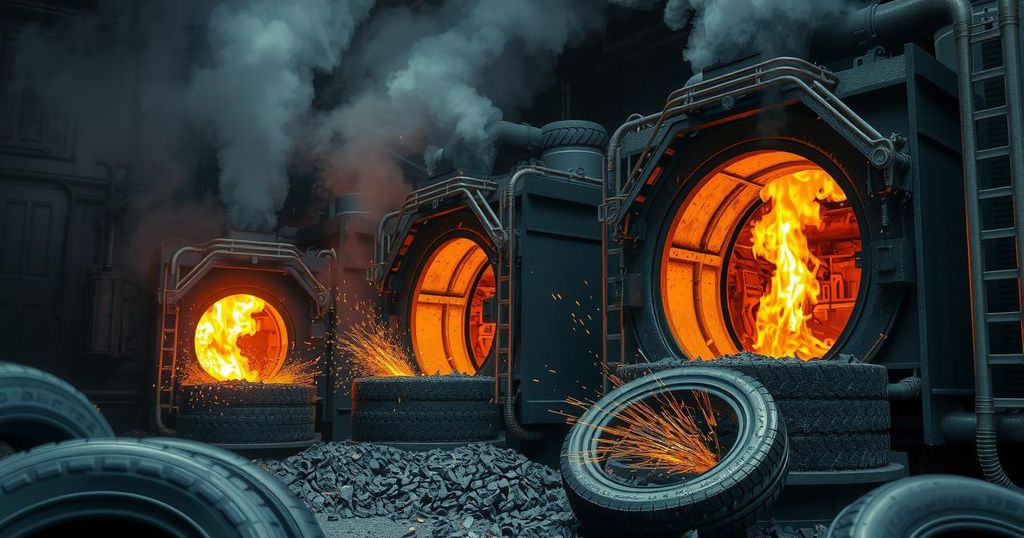UK Tyre Exports to India: A Recycling Crisis Uncovered

An investigation reveals that millions of UK tyres intended for recycling are instead being burned in illegal furnaces in India, leading to severe environmental and health issues. Industry insiders acknowledge the problem, with substantial exports going to the black market. Regulatory loopholes allow companies to exploit the system, raising concerns over accountability and the need for significant reform in the UK’s waste management policies.
Recent investigations reveal that millions of tyres exported from the UK to India for recycling are instead being incinerated in improvised furnaces, resulting in severe health and environmental repercussions. The majority of these waste tyres end up in the Indian black market, as acknowledged by industry experts, including Elliot Mason, a prominent tyre recycling facility owner in the UK. Campaigners assert that the UK government is complicit, as it is known to be one of the worst offenders in exporting waste tyres for such practices.
The UK generates approximately 50 million waste tyres annually, nearly half of which are exported to India. Garages charge a recycling fee of typically £3-6 per tyre, intended to ensure proper disposal. However, instead of being processed at legitimate recycling facilities, around 70% of the tyres are processed in makeshift facilities that use an extreme pyrolysis method, described as a primitive cooking process. This task occurs in substandard conditions that release harmful gases and chemicals into the environment.
An investigation collaboration between the BBC and SourceMaterial revealed the journey of these exported tyres, tracking shipments through various stages until their arrival in India. Upon reaching Indian shores, the tyres are transported hundreds of miles to rudimentary facilities where they are incinerated in massive furnaces. Despite being labeled for recycling, many imported tyres are subjected to illegal pyrolysis practices that severely endanger health and the environment.
In India, it is reported that there are about 2,000 pyrolysis plants, yet nearly half operate illegally. The environmental consequences are dire, too, with reports of polluted waterways and health issues arising from atmospheric pollutants. Notably, a tragic incident occurred when an explosion at one of these plants resulted in fatalities, raising concerns over safety and regulatory oversight. In response, local government officials have begun shutting down offending facilities.
While larger recycling operations are subject to strict regulations, smaller companies may exploit legal loopholes, such as the T8 exemption, allowing them to process tyres with minimal oversight. This has led to numerous exporters exceeding legal limits, thereby compounding the issue. A lack of accountability exists, as those in the industry admit to knowledge of the illegal practices but feel powerless to enact change.
The UK government’s Department for Environment, Food and Rural Affairs (Defra) expressed a commitment to reforming waste exemptions while recognizing the need for a circular economy that respects the environment. Comparatively, Australia has taken decisive action by banning the export of baled tyres after discovering misallocation.
Advocates like Georgia Elliott-Smith from Fighting Dirty emphasize the urgent need for the UK government to address this crisis, urging for the reclassification of tyres as hazardous waste to prevent further environmental degradation and protect public health.
The investigation into the exportation of UK tyres to India highlights significant environmental and health risks associated with improper recycling practices. Millions of tyres are misappropriated for illegal incineration rather than being processed correctly. The UK government faces pressure to reform its waste export policies to ensure sustainability and accountability, as seen in other nations like Australia. Addressing these risks is essential to protect both communities in import countries and the reputation of UK recycling efforts.
Original Source: www.bbc.com




